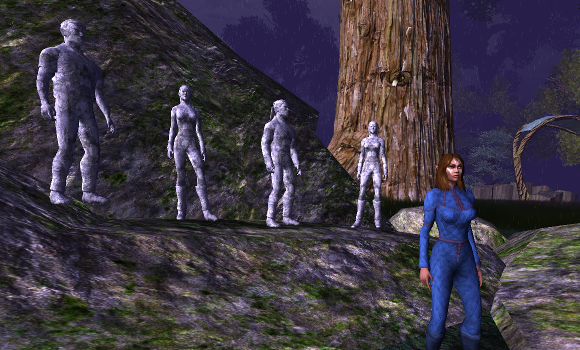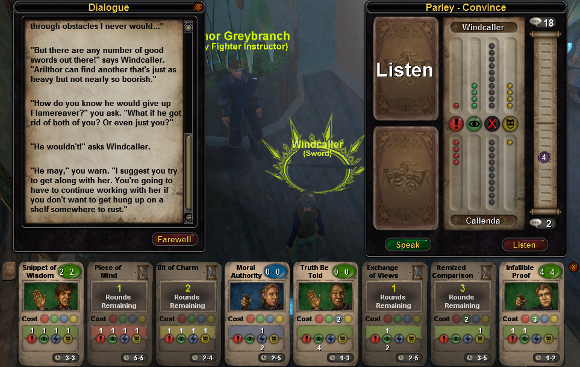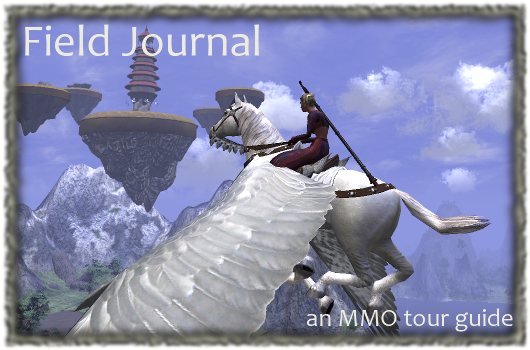Field Journal: Making peace with Vanguard
Vanguard: Saga of Heroes is a weird game. It seems almost purposefully to have been designed to turn away players before they can get a chance to see any of the good in it. Although I've tried it before, I've only recently been able to find some of that good, much to my even more recent dismay.
One of those good things I've found is the Diplomacy system. There's nothing revolutionary about it, but it is a solid and interesting minigame that stands apart from anything most MMOs offer. It's more than just a minigame, though; it's integrated with other systems to create a distinct and worthwhile approach to playing the game apart from adventuring. What makes a simple, card-based tug-of-war all that? I'll try to explain.
Sure, tell me your life story
Where Diplomacy stands out in Vanguard's content is as seemingly the foremost vehicle for narrative and lore. Considering that it's a system for social interaction with NPCs, I think that's a given. It's still important to recognize because the standard fighty-killkill-smash quests of Vanguard don't really try to do much of that, at least in the early parts.
First of all, Diplomacy has entirely its own quests with their own stories. While adventuring quests mostly just tell you whom you have to kill or loot, either because they're bad or it's necessary in some vaguely asserted way, Diplomacy quests get far more into the culture and relationships of the people you're interacting with.
On top of that, during a game of Diplomacy every successful turn reveals a new paragraph of text, laying out the actual conversation you're having. This has its shortcomings; for one, you can't affect the tone or content of the text that comes out. This is despite the names of the cards you and your opponent play being evocative of particular kinds of statements and reactions. Even the four broad, color-coded categories of card won't have any impact on the dialogue that comes out, so even using nothing but flattery can result in a conversation that portrays you as belligerent and brow-beating if that's what the writers ordained appropriate.
Although you get a lot of story and world-building delivered through the mechanism of Diplomacy, the world itself doesn't hold up that story very well. For example, in one quest, a few washed-out students of my current Diplomacy mentor had been voluntarily transmuted into unmoving stone in protest, rather than be relegated to bird-tending duties. While a quick stony texture slapped on actual character models did a decent job of creating statues, the developers had neglected to turn off their idle animations. With the way they shifted around, there was clearly nothing preventing them from tending to their fowl deeds.

The dialogue box itself is also a little too narrow for my liking, causing the conversation to scroll by quickly. If I get caught up in the cards for a few turns or have to double-check something earlier for reference, I can end up having to scroll back and forth to catch up too frequently. Just doubling the width of the dialogue box would help a great deal.
The system's shortcomings aside, I really appreciate an avenue of gameplay that allows me a chance to get into a lot of the lore detail that gets overlooked by other MMOs. Vanguard's lore is nothing spectacular; I'd call it largely serviceable and conventional. Lift the core conceit of Diplomacy, a way to deliver exposition about the setting and characters by matching wits in conversation with non-player characters, polish up the execution of it and place it in a game with a richer setting -- then you'll have something special.
Mind you, I have seen a system with a similar purpose in a game I have come to love dearly, and it was abysmal in comparison. The Parley system of Final Fantasy XIV was underdeveloped and hardly used, like almost everything else from the original launch. Still, the fact that it was tried once gives me hope that the current regime might try something like it again, only much bigger and better. The production team certainly puts a lot of care and effort into writing and implementing lore.
Number crunching
The actual mechanics of Diplomacy are very simple and use small numbers. The only time you might see numbers above 20 when you're in the middle of a game is during the turns for victory against a particularly obstinate opponent. The game's structure simply doesn't allow for big numbers anywhere else.
Winning Diplomacy is far more about having the right cards to neuter or exploit your opponent's overall strategy than making the right play at the right time. What you do each turn matters far less than your long term strategy. It is absolutely the better decision to let your opponent take control of the conversation in the short term if it means you'll gain more ground in several turns than you would playing safe.
Diplomacy is basically a tug-of-war in card form, even if the cards are purely digital abstractions representing gestures and expressions. There's a counter that gets pulled between you and your opponent, though unlike real tug-of-war you, in this game you can't win or lose by getting all the way over. Hitting the limit of 10 points simply makes it harder for the advantage to swing back to the other turn. Rather, as in most games of tug-of-war, victory comes from wearing down the opposition, in this case by holding the advantage until the number next to the speech bubble at your end counts down to zero.

Wow. That sounds like the tactics of a pick-up artist. Excuse me while I scrub myself until the unclean feeling goes away.
Where strategy comes into Diplomacy is the separation of cards into four categories of expression. Some powerful cards require resources matching their expression type, some cards build up your resources without helping you gain the advantage directly, some benefit you while giving your opponent resources, and some eliminate portions of your opponent's resources.
The type of conversation you're having determines whether certain types of expression points can be stocked by either side. Gossip's blocking Reason, Incite's blocking Flattery, and Entertain's blocking Demand make a certain amount of sense, even if being such absolutes is a bit weird. On the other hand, it seems completely backward that Convince blocks Inspire while Interview blocks nothing. Surely they'd make more sense swapped around?
Like adventuring, crafting, and gathering, Diplomacy has its own gear. You have outfits for all of these equipped simultaneously, switching your apparent outfit between them automatically or intentionally as appropriate. The stats on Diplomacy gear mostly serve to make you more appealing to people from specific walks of life, allowing you to strike up conversations with them.
These different types of gear are a nice RP idea, especially the Diplomacy gear. Having a nice set of clothing for impressing people you talk to separate from the more practical wear of your other occupations is very cool. But at least at low levels, it doesn't really work out quite right. My Blood Mage's richly patterned, midriff-baring robes meant for battle are much fancier than the sturdy tunic and breeches of her diplomatic outfit. Once again, Vanguard found a way to drop the ball on a good concept, and with the coming sunset, it's too late to fix it.
For the next week, I'm making the most of my SOE All Access pass with the other game that motivated me. Join me next time while I talk about the best currently operating superhero MMO on the market. That's DC Universe Online, in case you're confused.

There are so many weird and wonderful destinations to visit within the MMOscape, and Massively's Matthew Gollschewski hopes to chronicle them all for you every Thursday in his trusty Field Journal. Grab your camera and your adventurin' hat and join in on his next expedition, or just mail him some notes of your own.


